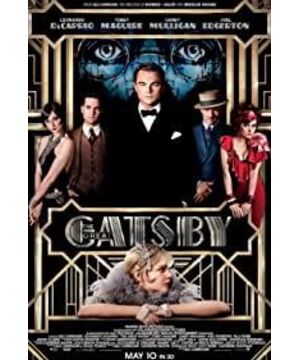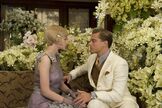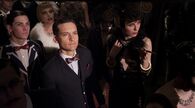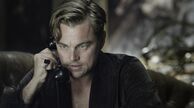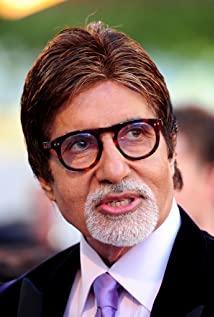Its trailer debuted as early as last year. The screen was filled with feathered dancers and ribbons flying in the sky in just a few minutes. Time and time again, it was very lively and made people mistaken for the director from Australia ( He has directed "Moulin Rouge") and is determined to reinterpret Fitzgerald's immortal work in the form of a song and dance film. Now it seems that it may not be a wise choice to be so, because at least if it is in line with the MV shooting style throughout the film, the audience will probably not be surprised by the occasional narration jumping on the screen. I was surprised anyway, because the subtitles gradually unfolded and disappeared as the narrative progressed, just like what I saw in KTV.
My first question is, why do you need such frequent narration? Unless it is deliberately done in a literary film (such as Wang Jiawei), the large amount of narration can only be seen as evidence of the lack of strength of the lens language. In this film, Nick Callaway’s narration does not promote the development of the plot, but also destroys the audience’s interest in summarizing and sorting out the plot. Its effect is only similar to the most common paragraph in middle school Chinese.
So, the second question is, did the film “make the best use of” the character Nick? In the novel, he is first of all the teller of the story. Not every story naturally has a narrator, sometimes they are invisible and become observers. The director's retention of this role can be regarded as faithful to the original. Secondly, he is the promoter of the plot. For example, he created the reunion of Daisy Buchanan and Gatsby and arranged the funeral of the latter, and the film did not deviate from the original. However, he is also a personality benchmark, representing traditional American values from the Midwest, and colliding with the New York-style value orientation represented by the Buchanans and Miss Jordan Baker. In addition to the main contradiction between Gatsby and Buchanan, the relationship between Nick and Jordan formed a secondary clue. From the beginning of the love and agreement to the unhappy ending, Fitzgerald spent a lot of money to manage this section. relation. It is a pity that the director abandoned it. The consequence is that the three-dimensional sense of the movie is greatly weakened, and I therefore have the following suspicions.
The third question is, does the director have insufficient trust in the audience's ability to understand? As we all know, "The Great Gatsby" is not a suspense novel, but it does not mean that it cannot be inserted into a suspenseful plot. When the story is carefully prepared to reach its climax, the film’s changes to two key plots make The following accidents disappeared. First of all, the novel did not directly write that Buchanan told Nelson that the murderer was Gatsby. This fact was later obtained through witness testimony and Callaway’s analysis. Therefore, Gatsby’s death was not in most readers. As expected. Secondly, the disappearance of the Buchanan couple in the novel lacks signs, because their plan was never guessed by Callaway. Such an arrangement aggravated the tragic end of Gatsby. Of course, the bleak scene of no one at the funeral should also be expressed in the picture rather than the narration (again, damn narration). In this way, the drama of the original can only face the movie audience with a broken image. The most ironic thing is that as one of the greatest works in the history of American literature, this book is a household name in the United States, and it is a must-read for many middle schools. This makes the director's intention to simplify the plot look more ridiculously clever.
In the end, I have to express my disappointment with the soundtrack. Jay-Z and Beyoncé are big names, and the tune sounds good, but don’t forget that the background of the story is set in the 1920s, when there was no such flavor.
Of course, to be fair, some scenes in the film are extremely expressive. For example, the scene where Gatsby anxiously awaits Callaway's return in the dark, from the embarrassment and caution at the beginning of the conversation to the relief and joy after knowing Callaway is willing to help him, Leonardo DiCaprio takes it back. The free performance is amazing. Another example is that Daisy was shocked by the flamboyant floral shirt, as if welcoming happiness from the sky, and finally fell drunk on Gatsby's bed, just right showing her superficial and superficial essence. Carey Mulligan's gentle voice and angelic face gave her everything to become Daisy, except for the brief but rapid spark between Gatsby and Gatsby.
Therefore, despite the use of a large number of digital effects, the rapid rotation and switching of the lens is dazzling, but the director left to film fans and literature lovers after all is a super full of flesh, explosive, gorgeous, chaotic, and untimely soundtrack. Long music video tape.
View more about The Great Gatsby reviews


